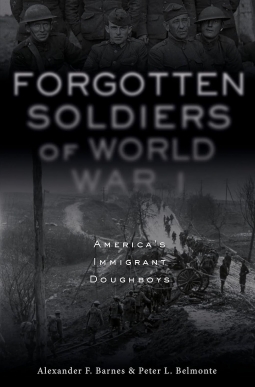A genuinely funny reminiscence written by an anonymous Doughboy recalling his days as an M.P. in war-torn France during the First World War:
"Now that it is all over I wonder what did I gain from my experiences as an M.P. in the great Army of Newton Baker's Best?...Watching the dawn coming rosily up over snow-clad barracks roofs and rows of tents; informing careless privates, sergeants, lieutenants and even majors to 'button that there button'; listening to the dull bang-slamming of artillery barrages on crossroads; jotting down the names of high-spirited young men found in cafés at the wrong hours -such things aren't of much lasting value."
Click here to read an article about the sexually-transmitted diseases among the American Army of W.W. I - and the M.P.s in particular...
The American writer Willis Gordon Brown recalled his days as a fighter pilot with the R.F.C. and the curious series of crashes that lead to the discovery of a German saboteur within their midst. "To the Germans this man was a highly respected hero giving his life for the fatherland; to us he became a rat of the lowest order." World War I had only been raging for six months when this article first appeared. As the journalist makes clear, one did not have to have an advanced degree in history to recognize that this war was unique; it involved almost every wealthy, industrialized European nation and their far-flung colonies; thousands of men were killed daily and many more thousands stepped forward to take their places. The writer recognized that this long anticipated war was an epic event and that, like the French Revolution, it would be seen by future generations as a marker which indicated that all changes began at that point:
"Those who were but a few months ago assuring us that there never could be another general war are most vociferously informing the same audience that this will be the last."
Click here to read about the W.W. I efforts of Prince Edward, the future Duke of Windsor.
The War That Ended Peace: The Road to 1914
 |
In writing a piece for La Revue Mondale ten years after the Armistice, Stéphane Lauzanne (1887 - 1928), Editor-in-Chief of the semi-official Paris Matin wrote a few bitter-sweet words about the American character and how it was both a hindrance and a benefit to the Allies in the war. Yet he was full of praise when he recalled the bold and forward-thinking manner in which America entered the war and committed both blood and treasure.
- from Amazon:

Click here to read an interview with the World War I American fighter pilot Eddy Rickenbacker. The power of positive thinking is one of the necessary elements that has been ingrained within the psyche of every U.S. Army recruit for at least the past 100 years. Positive thought is the topic of this 1918 article about the wartime training of U.S. Army officer cadets at Camp Grant, Illinois, by Major Herman J. Koehler (1859 – 1927), who believed deeply that "there is no limit to human endurance".
Read what the U.S. Army psychologists had to say about courage. Attached is a front page story from a 1918 NEW YORK TIMES that covered the important visit Secretary of War Newton Baker (1871 – 1937) had made to the American front line trenches during his World War I tenure at the Department of War. During this trip the former Ohio Governor donned trench coat, helmet and gas-mask while chatting it up with the Doughboys.
Click here to read an article from 1927 by General Pershing regarding the American cemeteries in Europe. |